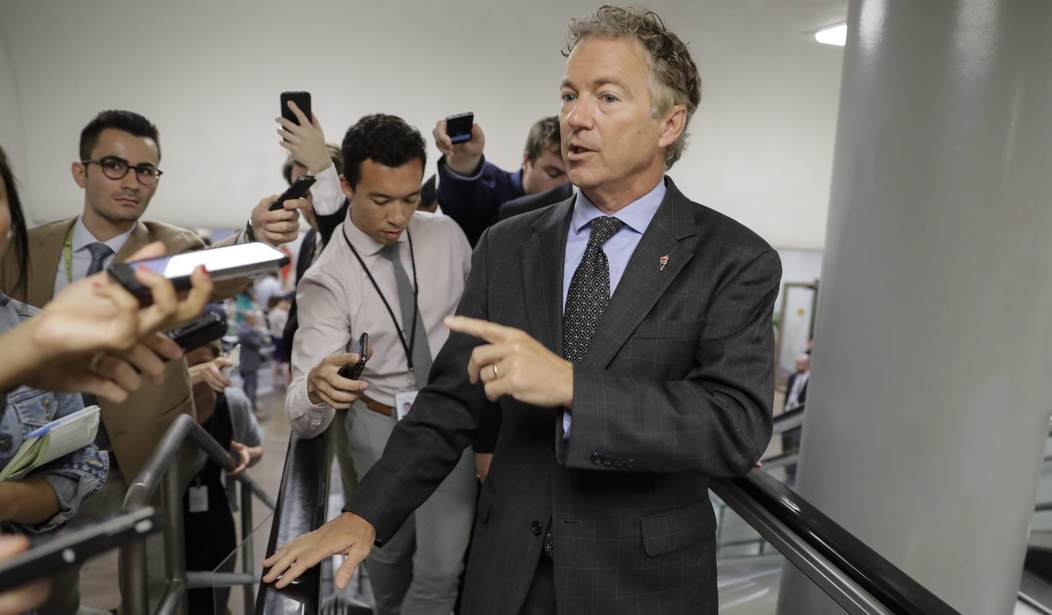WASHINGTON — Sen. Rand Paul (R-Ky.) predicted that the delay in voting on repeal and replace will prove even more toxic to the GOP healthcare bill as it will give more time for stakeholders to see it’s not Obamacare repeal.
Senate leadership has put the vote on hold since Sen. John McCain (R-Ariz.) had surgery Friday to remove a 5 cm blood clot from above his left eye, which the Mayo Clinic in Phoenix said was discovered during a routine physical. The hospital said the clot was removed “during a minimally invasive craniotomy with an eyebrow incision,” and “tissue pathology reports are pending within the next several days.”
McCain’s office said he was “in good spirits and recovering comfortably at home with his family,” and “on the advice of his doctors” will be recovering in Arizona this week. GOP leaders will need every possible vote to pass the healthcare bill as there are already two declared “no” votes.
Paul said Sunday on CBS that the latest iteration of the healthcare bill, which adds $45 million for opioid addiction, allows insurers to offer stripped-down plans and preserves some Obamacare taxes, is just “subsidizing the death spiral of Obamacare.”
“I think the longer the bill is out there, the more conservative Republicans are going to discover that it’s not repeal, and the more that everybody is going to discover that it keeps the fundamental flaw of Obamacare,” Paul said. “It keeps the insurance mandates that cause the prices to rise, which chase young, healthy people out of the marketplace, and leads to what people call adverse selection, where you have a sicker and sicker insurance pool, and the premiums keep rising through the roof.”
“And one of the amazing things to me is, for all the complaints of Republicans about Obamacare, we keep that fundamental flaw. And the reason, you know, Republicans acknowledge this is, they make a giant insurance fund to subsidize those prices… for all Republicans’ complaints about the death spiral of Obamacare, they don’t fix it. They simply subsidize it with taxpayer moneys, which I just don’t agree with at all.”
The senator said some of his conservative colleagues “think they’re trying to do what’s right.”
“So, they’re trying to make it legal to sell other insurance policies that don’t have the regs, but the problem is, is it’s being done in a context of keeping all of the overall regulatory scheme of Obamacare,” Paul said. “…And that’s why even the Cruz amendment, people are saying, oh, we need more money in the insurance bailout fund, because the Cruz amendment is going to cost us a lot of money, taxpayer money, to try to stabilize the insurance markets.”
Sen. Susan Collins (R-Maine), the other committed “no” vote on the healthcare bill, told CNN on Sunday that she’s not heard from President Trump in the past couple of weeks, though administration members have contacted her.
“This bill would impose fundamental, sweeping changes in the Medicaid program. And those include very deep cuts. That would affect some of the most vulnerable people in our society, including disabled children, poor seniors. It would affect our rural hospitals and our nursing homes. And they would have a very difficult time even staying in existence and serving vulnerable populations,” Collin said. “…You can’t take more than $700 billion out of the Medicaid program and not think that it’s going to have some kind of effect.”
She charged that Sen. Ted Cruz’s (R-Texas) amendment to allow insurance companies to sell bare-bones coverage plans is “unworkable” as “it would result in undermining the protections for people with pre-existing conditions and create two separate groups of individuals, and some of them would have very skimpy insurance coverage at a low price.”
“But it might not help them when they get sick. And then there would be the group of people who have serious medical problems and their premiums and deductibles would go sky high. Such that insurance would be unaffordable for many of them,” she added. “There is a way to deal with this and that is by creating a reinsurance pool for people with pre-existing conditions. That would help drive down premiums. We did it in Maine for 18 months before the Affordable Care Act went into effect and it was highly successful.”
Collins estimated eight to 10 Republican senators “have serious concerns about this bill.”
“And so at the end of the day, I don’t know whether it will pass. But I do know this. We should not be making fundamental changes in a vital safety net program that’s been on the books for 50 years, the Medicaid program, without having a single hearing to evaluating what the consequences are going to be. That doesn’t mean there aren’t problems with the Medicaid program that need to be addressed. It doesn’t mean that the ACA doesn’t have serious flaws. It does,” she said. “But that’s why we need go through the normal committee process and get input from people on both sides of the aisle. That’s what would produce the kind of legislation that we need.”









Join the conversation as a VIP Member